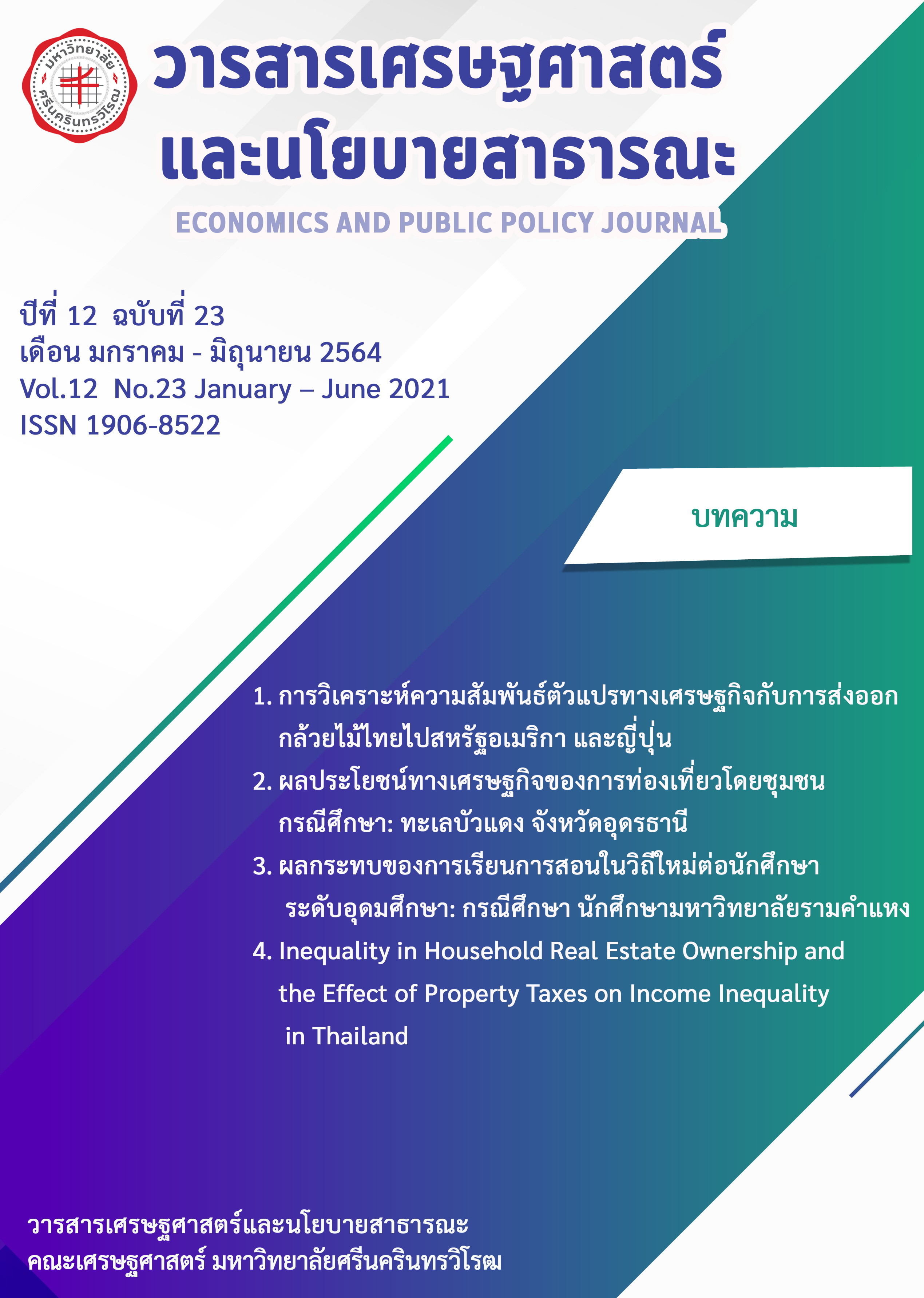ผลกระทบของการเรียนการสอนออนไลน์ต่อผลการเรียนและความคาดหวังต่อตลาดแรงงานของนักศึกษาระดับอุดมศึกษา: กรณีศึกษา นักศึกษามหาวิทยาลัยรามคำแหง
Main Article Content
บทคัดย่อ
การระบาดของโรคโควิด-19 ทำให้สถาบันการศึกษาต้องจัดการเรียนการสอนแบบออนไลน์ทั้งหมด งานวิจัยชิ้นนี้ศึกษาผลกระทบของการเรียนการสอนแบบออนไลน์ต่อผลการเรียนและความคาดหวังต่อตลาดแรงงานของนักศึกษาในระดับอุดมศึกษา โดยสนใจผลกระทบใน 10 ด้าน ได้แก่ 1) เกรดเฉลี่ย 2) จำนวนชั่วโมงเรียนต่อสัปดาห์ 3) การจบการศึกษาช้ากว่ากำหนด 4) การถอนกระบวนวิชา 5) การเปลี่ยนเมเจอร์ 6) จำนวนชั่วโมงงานที่ทำอยู่ต่อสัปดาห์ 7) รายได้จากงานต่อสัปดาห์ 8) คนในครอบครัวตกงาน และ/หรือ มีรายได้ที่น้อยลง 9) รายได้ขั้นต่ำที่ยอมรับได้หลังจบการศึกษา และ 10) โอกาสที่จะทำงานรับราชการ จากการสัมภาษณ์นักศึกษามหาวิทยาลัยรามคำแหง จำนวน 100 คน โดยใช้แบบสอบถาม ผลการศึกษาพบว่า การเรียนการสอนในรูปแบบออนไลน์ทั้งหมดส่งผลกระทบต่อผลสัมฤทธิ์ทางการศึกษาและความคาดหวังต่อตลาดแรงงงานในอนาคตอย่างมีนัยสำคัญทางสถิติ การเรียนการสอนแบบออนไลน์ในช่วงการระบาดของโรคโควิด-19 ทำให้ผลการเรียนเฉลี่ยของนักศึกษาลดลง 0.17 จุด ขณะที่จำนวนชั่วโมงเรียนต่อสองสัปดาห์ลดลง 4 ชั่วโมง นอกจากนั้น ยังทำให้นักศึกษาตัดสินใจชะลอการจบการศึกษาและถอนกระบวนวิชา ขณะที่ค่าตอบแทนจากการทำงานที่ยอมรับได้หลังจบการศึกษาลดลงอย่างมีนัยสำคัญทางสถิติ อีกทั้งยังทำให้นักศึกษามีความสนใจในอาชีพรับราชการเพิ่มมากขึ้นอย่างมีนัยสำคัญทางสถิติ ทั้งนี้ ผลกระทบในด้านอื่น ๆ ไม่มีนัยสำคัญทางสถิติ
Article Details

อนุญาตภายใต้เงื่อนไข Creative Commons Attribution-NonCommercial-NoDerivatives 4.0 International License.
สงวนลิขสิทธิ์ © 2553 คณะเศรษฐศาสตร์ มหาวิทยาลัยศรีนครินทรวิโรฒ
คณะเศรษฐศาสตร์ มหาวิทยาลัยศรีนครินทรวิโรฒ จัดพิมพ์วารสารเศรษฐศาสตร์และนโยบายสาธารณะ เพื่อเผยแพร่บทความวิชาการทางเศรษฐศาสตร์ นโยบายสารธารณะ และสาขาอื่นๆที่เกี่ยวข้อง ทัศนะและข้อคิดเห็นใดๆ ที่ปรากฏในวารสารเป็นความคิดเห็นส่วนตัวของผู้เขียน โดยบทความที่ได้รับการตอบรับจะถือเป็นลิขสิทธิ์ของคณะเศรษฐศาสตร์ มหาวิทยาลัยศรีนครินทรวิโรฒ
บรรณาธิการ อาจารย์ ดร.พลพัธน์ โคตรจรัส
เอกสารอ้างอิง
เบญจธรรม ดิสกุล และมณฑล สรไกรกิติกูล. (2561). เบื้องลึกของการเป็นข้าราชการ: แรงจูงใจในการบริการสาธารณะและสวัสดิการ. วารสารธุรกิจปริทัศน์. ปีที่ 10 ฉบับที่ 1 หน้าที่ 55-71.
อภิณัฏฐ์ ทรัพย์มาก และเนตรนภา ไวทย์เลิศศักดิ์. (2559). ปัจจัยในการเลือกอาชีพรับราชการ ก่อนและหลังการประกาศใช้พระราชบัญญัติระเบียบข้าราชการพลเรือน พ.ศ. 2551: กรณีศึกษาสำนักงานคณะกรรมการการศึกษาขั้นพื้นฐาน กระทรวงศึกษาธิการ. วารสารบริหารธุรกิจ เศรษฐกิจและการสื่อสาร. ปีที่ 11 ฉบับที่ 1 หน้า 83-97.
Agostinelli, F., Doepke, M., Sorrenti, G., and Zilibotti, F. (2022). When the great equalizer shuts down: Schools, peers, and parents in pandemic times. Journal of Public Economics, 206.
Alpert, W. T., Couch, K. A., & Harmon, O. R. (2016). A randomized assessment of online learning. American Economic Review, 106(5), 378-382.
Angrist, J. D., & Pischke, J.-S. (2009). Mostly Harmless Econometrics: An Empiricist’s Companion. Princeton: Princeton University Press.
Arcidiacono, P., Hotz, V. J., Maurel, A., & Romano, T. (2020). Ex ante returns and occupational choice. Journal of Political Economy, 128(12).
Aucejo, E. M., French, J., Araya, M. P. U., & Zafar, B. (2020). The impact of COVID-19 on student experiences and expectations: Evidence from a survey. Journal of Public Economics, 191.
Cacault, M. P., Hilderbrand, C., Laurent-Lucchetti, J., & Pellizzari, M. (2021). Distance learning in higher education: Evidence from a randomized experiment. Journal of European Economic Association, 19(4), 2322-2372.
Chetty, R., Friedman, J. N., Hendren, N., Stepner, M., & The Opportunity Insights Team. (2020). The economic impacts of COVID-19: Evidence from a new public database built using private sector data. NBER Working Paper No. 27431. Cambridge, MA: National Bureau of Economic Research. Retrieved November 30, 2020 from https://www.nber.org/papers/w27431
Christensen, C. M., & Eyring, H. J. (2011). The Innovative University: Changing the DNA of Higher Education from the Inside Out. San Francisco, California: Jossey-Bass.
Clark, A. E., Nong, H., Zhu, H., and Zhu, R. (2021). Compensating for academic loss: Online learning and student performance during the COVID-19 pandemic. China Economic Review, 68.
Coates, D., Humphreys, B. R., Kane, J., & Vachris, M. A. (2004). “No significant distance” between face-to-face and online instruction: Evidence from principles of economics. Economics of Education Review, 23(5), 533-546.
Cowen, T., & Tabarrok, A. (2014). The industrial organization of online education. American Economic Review, 104(5), 519-522.
Deming, D. J., Goldin, C., Katz, L. F., & Yuchtman, N. (2015). Can online learning bend the higher education cost curve? American Economic Review, 105(5), 496-501.
Dutton, J., Dutton, M., & Perry, J. (2002). How do online students differ from lecture students? Journal of Asynchronous Learning Networks, 6(1), 1-20.
Figlio, D., Rush, M., & Yin, L. (2013). Is it live or is it internet? Experimental estimates of the effects of online instruction on student learning. Journal of Labor Economics, 31(4), 763-784.
Heckman, J. J., & Vytlacil, E. (2005). Structural equations, treatment effects, and econometric policy evaluation. Econometrica, 73(3), 669-738.
Joyce, T., Crockett, S., Jaeger, D. A., Altindag, O., & O’Connell, S. D. (2015). Does classroom time matter? Economics of Education Review, 46, 64-77.
Kofoed, M. S., Gebhard, L., Gilmore, D., & Moschitto, R. (2021). Zooming to class?: Experimental evidence on college student’s online learning during COVID-19. IZA Discussion Paper No. 14356.
Kuhfeld, M., Soland, J., Tarasawa, B., Johnson, A., Ruzek, E., & Liu, J. (2020). Projecting the potential impact of COVID-19 school closures on academic achievement. Educational Research, 49(8), 549-565.
OECD. (2020). Learning Remotely When Schools Close: How Well are Students and Schools Prepared? Insights from PISA. Retrieved November 30, 2020 https://www.oecd.org/coronavirus/policy-responses/learning-remotely-when-schools-close-how-well-are-students-and-schools-prepared-insights-from-pisa-3bfda1f7/
Owusu-Fordjour, C., Koomson, C. K., & Hanson, D. (2020). The impact of COVID-19 on learning: The perspective of the Ghanaian student. European Journal of Education Studies, 7(3), 88-101.
Rothstein, J. (2020). The lost generation? Labor market outcomes for post great recession entrants. NBER Working Paper No. 27516. Cambridge, MA: National Bureau of Economic Research. Retrieved November 30, 2020 https://www.nber.org/papers/w27516
Shahzad, A., Hassan, R., Aremu, A. Y., Hussain, A., & Lodhi, R. N. (2020). Effects of COVID-19 in E-learning on higher education institution students: The group comparison between male and female. Quality & Quantity, 55, 805-826.
Takaku, R., and Yokoyama, I. (2021). What the COVID-19 school closure left in its wake: Evidence from a regression discontinuity analysis in Japan. Journal of Public Economics, 195.
UNESCO. (2020). Education: From Disruption to Recovery. Retrieved November 30, 2020 https://en.unesco.org/covid19/educationresponse
United Nations. (2020). Education during COVID-19 and beyond. United Nations.
Wiswall, M., & Zafar, B. (2020). Human capital investments and expectations about career and family. Journal of Political Economy (forthcoming).
Yamane, T. (1973). Statistics: An Introductory Analysis (3nd edition). New York: Harper & Row.


